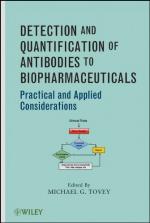|
This section contains 954 words (approx. 4 pages at 300 words per page) |

|
The immune system uses two main approaches to fight off infection. The first is a general approach known as cell-mediated immunity in which certain immune system cells attack and destroy infectious invaders. The second approach is more specialized and is known as humoral immunity. The cornerstone of humoral immunity is formed by antibodies. Antibodies latch onto infectious invaders such as viruses, bacteria, molds, and parasites and swiftly aid in their destruction.
Antibodies are proteins that belong to a class of protein molecules called immunoglobulins (Ig), also known as gamma-globulins. Immunoglobulins are the most important molecules in the immune system. They have been reported to consist of 19,996 atoms associated in 1,320 amino acid units. The three main groups of immunoglobulins are IgG (a glycoprotein and the immunoglobulin present in the body in the largest concentration), IgA, and IgM. Immunoglobulin G has a molecular weight of about 160,000. The larger chains each...
|
This section contains 954 words (approx. 4 pages at 300 words per page) |

|


